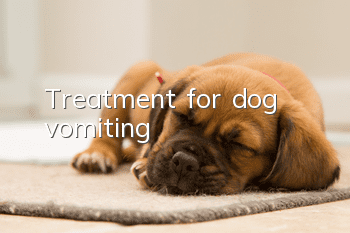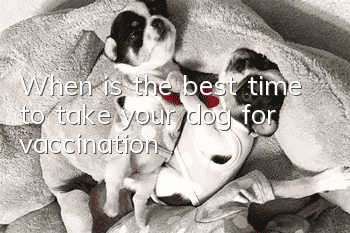Treatment for dog vomiting

Most of the causes of vomiting are related to gastritis, and most of the causes of diarrhea are related to enteritis. If not treated, vomiting may lead to diarrhea, and vice versa. If the dog is obviously sick or the body temperature is more than 1C higher than normal (38.5C), it should be Seek veterinary treatment as soon as possible.
Main causes of vomiting in puppies:
1. Eating bones, especially chicken bones, can easily scratch the esophagus, irritate the stomach wall, and cause vomiting.
2. When eating dog food for the first time, if the owner does not control the feeding amount well, it will cause the puppy to eat too much. After the dog biscuits enter the stomach, they will expand several times when encountering gastric acid. The stomach capacity will be insufficient, causing vomiting.
3. If the puppy eats unclean food, or if the puppy does not eat the food in time when it is placed in the food bowl, it will spoil. After the puppy eats it, it will cause gastritis and vomiting.
4. Puppies like to use their tongues to feel the outside world. When they are sprayed with deworming drugs on the grass where they play every day, once the puppies lick these drugs, they will be poisoned and cause vomiting.
5. When unvaccinated puppies suffer from viral diseases, some will have intractable vomiting and will continue to vomit even if they do not eat or drink.
6. Severe intestinal parasitic infection. Ascaris worms accidentally penetrate from the alkaline intestine into the acidic stomach and struggle to irritate the stomach wall, causing vomiting.
7. After the female dog has pyometra, she will develop symptoms of sepsis and vomiting.
8. Elderly dogs suffer from chronic renal failure and vomiting caused by high blood ammonia, high blood phosphorus, etc.
Vomiting under special circumstances:
1. Vomiting during intravenous infusion
Intravenous infusion increases the pressure on the heart, lungs, and thoracic blood vessels. Vomiting may occur when the infusion rate is high. Whether the speed of infusion is appropriate is related to the physical condition of the dog receiving intravenous infusion. It should be analyzed specifically and the speed of infusion should be controlled by the animal doctor.
In addition, the concentration of ions in the liquid, the pH, the amount of blood sugar, and the drugs also have an impact on the vomiting of dogs, and the impact on seriously ill dogs is even greater. Therefore, once the puppy vomits during infusion, the veterinarian should be consulted immediately to adjust the infusion speed.
2. Motion sickness
Some dogs are not used to riding in cars and may suffer from motion sickness and vomiting. These are normal phenomena and owners do not need to worry too much. Let it settle down and you'll get used to it after a while. Some dogs will never get carsick again after being car-sick a few times. For dogs with the habit of motion sickness, the symptoms can be relieved by not eating or drinking before traveling.
3. Retching
During retching, the dog has vomiting movements but no vomitus is discharged. This condition occurs mainly in diaphragmatic spasms.
Dog vomiting treatment:
As mentioned above, there are many causes of vomiting. As a symptom of some infectious or chronic diseases, if you want to treat vomiting, you must first treat the disease, which requires professional treatment by a veterinarian. However, in more cases, puppy vomiting is mostly due to gastrointestinal discomfort caused by overeating. This situation can be solved by the owner himself!
1. Fasting:
Once it is found that the puppy's gastrointestinal overload is overloaded and vomiting occurs, as long as they are fasted for 24 hours, the gastrointestinal function will most likely be restored to its original normal function. If you are still vomiting after 24 hours, you should take your dog to the doctor!
2. Don’t stop drinking water:
When puppies no longer vomit violently, owners can encourage them to drink more water to prevent pets from dehydration.
3. Cover the toilet:
In order to prevent thirsty puppies from looking for water to drink, the owner must remember to close the toilet seat before leaving the toilet, so that they will not be buried in the toilet as if they have found an oasis in the desert. Lots of dirt.
4. Mild food:
After fasting for a whole day, the dog’s stomach must be very hungry. The veterinarian reminds you not to let the poor puppy take a supplement at this time, otherwise all your efforts and patience will be in vain.
In order to slowly restore their gastrointestinal function to normal function, owners can feed puppies canned food with professional gastrointestinal prescriptions. After one day, if they do not show vomiting or other symptoms of discomfort, the amount of feeding can be slightly increased.
5. Normal eating:
After feeding the prescribed food for two days and the puppy's reaction is normal, the owner can start to adjust back to the original food. However, veterinarians recommend that you only replace a quarter of the old food every day, and wait until four days before letting the puppy eat completely back to the previous food.
Warm reminder:
1. In addition to the reasons mentioned above, digestive tract diseases can also cause vomiting. For example, pharyngeal or esophageal spasm can cause vomiting in puppies, persistent vomiting can occur when gastrointestinal foreign body obstruction or intussusception occurs, peritonitis or Acute pancreatitis causes severe abdominal pain and vomiting.
2. Generally, puppiesOn the first day of continuous vomiting, the owner can consult a veterinarian to give the puppy appropriate medication. If the vomiting does not improve the next day, he must go to the hospital for a detailed examination to determine the cause!
3. Some owners may observe that their puppies occasionally vomit in the early morning and vomit a small amount of white or yellow liquid. As long as this does not happen every day, owners do not need to worry too much and do not give any medicine to their puppies.
- Dogs holding in their urine may accidentally develop bladder stones. Owners should pay attention!
- What preparations should be made before neutering a dog? Things to note when neutering your dog!
- What's the best way to prevent your dog from having his nails cut?
- What are the types of parasites in dogs?
- A foreign netizen brought his dog to the stage to perform, but it frightened the host and caused an uproar in the audience.
- Tips to determine if your Bichon Frize is sick, 14 symptoms of Bichon Frize!
- What is the average lifespan of a Chihuahua?
- Labrador daily training precautions
- What to do if your dog has mouth ulcers
- What to do if your Husky has body odor



